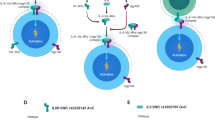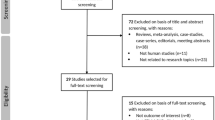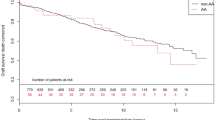Abstract
The effect of polymorphims in leptin and adiponectin genes on long-term outcomes of renal transplantation is unknown. In 349 renal transplant recipients (RTR), we aimed to determine associations between five SNPs in the leptin receptor (LEPR) and adiponectin (ADIPOQ) genes and these outcomes. Follow-up time ranged from 2 to 25 years (mean 10.29 ± 5.16 years). Two SNPs showed associations with long-term outcomes and their statistical significance greatly increased after 39 RTR with a history of cardiovascular events prior to transplantation were removed from the analysis. Adjusted odds ratios (OR) for LEPR rs1805094 and ADIPOQ rs1501299 and risk of graft loss were 0.35 (0.16–0.74) p = 0.006 and 2.37 (1.28–4.37) p = 0.006, respectively. The assessment of risk for global mortality revealed OR values of 0.20 (0.06–0.62), p = 0.005, and 2.43 (1.08–5.44), p = 0.031 for LEPR rs1805094 and ADIPOQ rs1501299, respectively. Our results show that polymorphism in genes involved in leptin and adiponectin function modify long-term outcomes in renal transplantation.
This is a preview of subscription content, access via your institution
Access options
Subscribe to this journal
Receive 6 print issues and online access
$259.00 per year
only $43.17 per issue
Buy this article
- Purchase on Springer Link
- Instant access to full article PDF
Prices may be subject to local taxes which are calculated during checkout


Similar content being viewed by others
References
Coelho M, Oliveira T, Fernandes R. Biochemistry of adipose tissue: an endocrine organ. Arch Med Sci. 2013;9:191–200.
Loffreda S, Yang SQ, Lin HZ, Karp CL, Brengman ML, Wang DJ, et al. Leptin regulates proinflammatory immune responses. FASEB J. 1998;12:57–65.
Hossain MM, Mukheem A, Kamarul T. The prevention and treatment of hypoadiponectinemia-associated human diseases by up-regulation of plasma adiponectin. Life Sci. 2015;135:55–67.
Nagy K, Nagaraju SP, Rhee CM, Mathe Z, Molnar MZ. Adipocytokines in renal transplant recipients. Clin Kidney J. 2016;9:359–73.
Alam A, Molnar MZ, Czira ME, Rudas A, Ujszaszi A, Kalantar-Zadeh K, et al. Serum adiponectin levels and mortality after kidney transplantation. Clin J Am Soc Nephrol. 2013;8:460–7.
Romanowski M, Dziedziejko V, Maciejewska-Karlowska A, Sawczuk M, Safranow K, Domanski L, et al. Adiponectin and leptin gene polymorphisms in patients with post-transplant diabetes mellitus. Pharmacogenomics. 2015;16:1243–51.
Kang ES, Magkos F, Kim BS, Zhai R, Su L, Kim YS, et al. Variants of the adiponectin and adiponectin receptor-1 genes and posttransplantation diabetes mellitus in renal allograft recipients. J Clin Endocrinol Metab. 2012;97:E129–35.
Nicoletto BB, Souza GC, Fonseca NK, Centenaro A, Manfro RC, Canani LH, et al. Association between 276G/T adiponectin gene polymorphism and new-onset diabetes after kidney transplantation. Transplantation. 2013;96:1059–64.
Mota-Zamorano S, Luna E, Garcia-Pino G, Gonzalez LM, Gervasini G. Variability in the leptin receptor gene and other risk factors for post-transplant diabetes mellitus in renal transplant recipients. Ann Med. 2019;51:164–73.
Mendez-Hernandez A, Gallegos-Arreola MP, Moreno-Macias H, Espinosa Fematt J, Perez-Morales R. LEP rs7799039, LEPR rs1137101, and ADIPOQ rs2241766 and 1501299 polymorphisms are associated with obesity and chemotherapy response in mexican women with breast cancer. Clin Breast Cancer. 2017;17:453–62.
Wu J, Liu Z, Meng K, Zhang L. Association of adiponectin gene (ADIPOQ) rs2241766 polymorphism with obesity in adults: a meta-analysis. PLoS ONE. 2014;9:e95270.
Lian Y, Tang Z, Xie Y, Chen Z. Leptin receptor gene polymorphisms and risk of hypertension: a meta-analysis. Int J Clin Exp Med. 2015;8:14277–82.
Jackson KG, Delgado-Lista J, Gill R, Lovegrove JA, Williams CM, Lopez-Miranda J, et al. The leptin receptor Gln223Arg polymorphism (rs1137101) mediates the postprandial lipaemic response, but only in males. Atherosclerosis. 2012;225:135–41.
Wang Z, Diao J, Yue X, Zhong J. Effects of ADIPOQ polymorphisms on individual susceptibility to coronary artery disease: a meta-analysis. Adipocyte. 2019;8:137–43.
Chiodini BD, Specchia C, Gori F, Barlera S, D’Orazio A, Pietri S, et al. Adiponectin gene polymorphisms and their effect on the risk of myocardial infarction and type 2 diabetes: an association study in an Italian population. Ther Adv Cardiovasc Dis. 2010;4:223–30.
Aijala M, Santaniemi M, Bloigu R, Kesaniemi YA, Ukkola O. Leptin receptor Arg109 homozygotes display decreased total mortality as well as lower incidence of cardiovascular disease and related death. Gene. 2014;534:88–92.
Perico N, Cattaneo D, Sayegh MH, Remuzzi G. Delayed graft function in kidney transplantation. Lancet. 2004;364:1814–27.
Joosten SA, Sijpkens YW, van Kooten C, Paul LC. Chronic renal allograft rejection: pathophysiologic considerations. Kidney Int. 2005;68:1–13.
Gervasini G, Garcia M, Macias RM, Benitez J, Caravaca F, Cubero JJ. CYP2C8*3 polymorphism and donor age are associated with allograft dysfunction in kidney transplant recipients treated with calcineurin inhibitors. J Clin Pharm. 2013;53:427–34.
Levey AS, Greene T, Kuske J, Beck GJ, Group MS. A simplified equation to predict glomerular filtration rate from serum creatinine. J Am Soc Nephrol. 2000;11:155A.
National Kidney Foundation. K/DOQI clinical practice guidelines for chronic kidney disease: evaluation, classification, and stratification. Am J Kidney Dis. 2002; 39: S1–S266.
Gervasini G, Luna E, Garcia-Pino G, Azevedo L, Mota-Zamorano S, Jose Cubero J. Polymorphisms in genes involved in vasoactive eicosanoid synthesis affect cardiovascular risk in renal transplant recipients. Curr Med Res Opin. 2018;34:247–53.
Lebranchu Y, Baan C, Biancone L, Legendre C, Morales JM, Naesens M, et al. Pretransplant identification of acute rejection risk following kidney transplantation. Transpl Int. 2014;27:129–38.
Gervasini G, Garcia-Cerrada M, Coto E, Vergara E, Garcia-Pino G, Alvarado R, et al. A 3’-UTR polymorphism in soluble epoxide hydrolase gene is associated with acute rejection in renal transplant recipients. PLoS ONE 2015;10:e0133563.
Gervasini G, Garcia-Cerrada M, Vergara E, Garcia-Pino G, Alvarado R, Fernandez-Cavada MJ, et al. Polymorphisms in CYP-mediated arachidonic acid routes affect the outcome of renal transplantation. Eur J Clin Invest. 2015;45:1060–8.
Nicoletto BB, Souza GC, Goncalves LF, Costa C, Perry IS, Manfro RC. Leptin, insulin resistance, and metabolic changes 5 years after renal transplantation. J Ren Nutr. 2012;22:440–9.
Idorn T, Hornum M, Bjerre M, Jorgensen KA, Nielsen FT, Hansen JM, et al. Plasma adiponectin before and after kidney transplantation. Transpl Int. 2012;25:1194–203.
Marie CS, Verkerke HP, Paul SN, Mackey AJ, Petri WA Jr. Leptin protects host cells from Entamoeba histolytica cytotoxicity by a STAT3-dependent mechanism. Infect Immun. 2012;80:1934–43.
Verkerke H, Naylor C, Zabeau L, Tavernier J, Petri WA Jr, Marie C. Kinetics of leptin binding to the Q223R leptin receptor. PLoS ONE 2014;9:e94843.
Fonseca I, Oliveira JC, Santos J, Malheiro J, Martins LS, Almeida M, et al. Leptin and adiponectin during the first week after kidney transplantation: biomarkers of graft dysfunction? Metabolism. 2015;64:202–7.
Chung WK, Power-Kehoe L, Chua M, Chu F, Aronne L, Huma Z, et al. Exonic and intronic sequence variation in the human leptin receptor gene (LEPR). Diabetes. 1997;46:1509–11.
Oliveira R, Cerda A, Genvigir FD, Sampaio MF, Armaganijan D, Bernik MM, et al. Leptin receptor gene polymorphisms are associated with adiposity and metabolic alterations in Brazilian individuals. Arq Bras Endocrinol Metab. 2013;57:677–84.
Wieczorek S, Holle JU, Bremer JP, Wibisono D, Moosig F, Fricke H, et al. Contrasting association of a non-synonymous leptin receptor gene polymorphism with Wegener’s granulomatosis and Churg–Strauss syndrome. Rheumatology. 2010;49:907–14.
de Luis DA, Aller R, Sagrado MG, Izaola O, Terroba MC, Cuellar L, et al. Influence of lys656asn polymorphism of leptin receptor gene on surgical results of biliopancreatic diversion. J Gastrointest Surg. 2010;14:899–903.
de Luis DA, Aller R, Izaola O, Gonzalez Sagrado M, Conde R, de la Fuente B, et al. Effect of Lys656Asn polymorphism of leptin receptor gene on cardiovascular risk factors and serum adipokine levels after a high polyunsaturated fat diet in obese patients. J Clin Lab Anal. 2015;29:432–6.
Popruk S, Tungtrongchitr R, Petmitr S, Pongpaew P, Harnroongroj T, Pooudong S, et al. Leptin, soluble leptin receptor, lipid profiles, and LEPR gene polymorphisms in Thai children and adolescents. Int J Vitam Nutr Res. 2008;78:9–15.
Moraes-Vieira PM, Bassi EJ, Larocca RA, Castoldi A, Burghos M, Lepique AP, et al. Leptin deficiency modulates allograft survival by favoring a Th2 and a regulatory immune profile. Am J Transplant: Off J Am Soc Transplant Am Soc Transpl Surg. 2013;13:36–44.
Molnar MZ, Nagy K, Remport A, Gaipov A, Fulop T, Czira ME, et al. Association between serum leptin level and mortality in kidney transplant recipients. J Ren Nutr. 2017;27:53–61.
Mishra S, Harris TB, Hsueh WC, Hue T, Leak TS, Li R, et al. The association of serum leptin with mortality in older adults. PLoS ONE 2015;10:e0140763.
Wang S, Qiao FY, Feng L. High leptin level and leptin receptor Lys656Asn variant are risk factors for preeclampsia. Genet Mol Res. 2013;12:2416–22.
Bender N, Allemann N, Marek D, Vollenweider P, Waeber G, Mooser V, et al. Association between variants of the leptin receptor gene (LEPR) and overweight: a systematic review and an analysis of the CoLaus study. PLoS ONE 2011;6:e26157.
De Luis DA, Gonzalez Sagrado M, Aller R, Izaola O, Conde R, Castro MJ. Lys656Asn polymorphism of leptin receptor gene and metabolic syndrome in obese patients. Eur Rev Med Pharm Sci. 2011;15:463–8.
Jevnikar AM, Mannon RB. Late kidney allograft loss: what we know about it, and what we can do about it. Clin J Am Soc Nephrol. 2008;3(Suppl 2):S56–67.
Luo Y, Liu M. Adiponectin: a versatile player of innate immunity. J Mol Cell Biol. 2016;8:120–8.
Whitehead JP, Richards AA, Hickman IJ, Macdonald GA, Prins JB. Adiponectin-a key adipokine in the metabolic syndrome. Diabetes Obes Metab. 2006;8:264–80.
Tian M, Tang L, Wu Y, Beddhu S, Huang Y. Adiponectin attenuates kidney injury and fibrosis in deoxycorticosterone acetate-salt and angiotensin II induced CKD mice. Am J Physiol Renal Physiol. 2018;315:F558–F571.
Menzaghi C, Trischitta V, Doria A. Genetic influences of adiponectin on insulin resistance, type 2 diabetes, and cardiovascular disease. Diabetes. 2007;56:1198–209.
Mohammadzadeh G, Ghaffari MA, Heibar H, Bazyar M. Association of two common single nucleotide polymorphisms (+45T/G and +276G/T) of ADIPOQ gene with coronary artery disease in type 2 diabetic patients. Iran Biomed J. 2016;20:152–60.
Bacci S, Menzaghi C, Ercolino T, Ma X, Rauseo A, Salvemini L, et al. The +276 G/T single nucleotide polymorphism of the adiponectin gene is associated with coronary artery disease in type 2 diabetic patients. Diabetes Care. 2004;27:2015–20.
Hara K, Boutin P, Mori Y, Tobe K, Dina C, Yasuda K, et al. Genetic variation in the gene encoding adiponectin is associated with an increased risk of type 2 diabetes in the Japanese population. Diabetes. 2002;51:536–40.
Katakami N, Kaneto H, Matsuoka TA, Takahara M, Maeda N, Shimizu I, et al. Adiponectin G276T gene polymorphism is associated with cardiovascular disease in Japanese patients with type 2 diabetes. Atherosclerosis. 2012;220:437–42.
Hwang JY, Park JE, Choi YJ, Huh KB, Kim WY. SNP276G>T polymorphism in the adiponectin gene is associated with metabolic syndrome in patients with type II diabetes mellitus in Korea. Eur J Clin Nutr. 2010;64:105–7.
Filippi E, Sentinelli F, Romeo S, Arca M, Berni A, Tiberti C, et al. The adiponectin gene SNP+276G>T associates with early-onset coronary artery disease and with lower levels of adiponectin in younger coronary artery disease patients (age <or=50 years). J Mol Med. 2005;83:711–9.
Gui MH, Li X, Jiang SF, Gao J, Lu DR, Gao X. Association of the adiponectin gene rs1501299 G>T variant, serum adiponectin levels, and the risk of coronary artery disease in a Chinese population. Diabetes Res Clin Pract. 2012;97:499–504.
Sun K, Li Y, Wei C, Tong Y, Zheng H, Guo Y. Recessive protective effect of ADIPOQ rs1501299 on cardiovascular diseases with type 2 diabetes: a meta-analysis. Mol Cell Endocrinol. 2012;349:162–9.
Acknowledgements
The authors want to thank the technical and human support provided by the Facility of Bioscience Applied Techniques of SAIUEx (financed by UEX, Junta de Extremadura, MICINN, FEDER and FSE). This work has been supported in part by grants PI15/00804 and PI18/00745 from Instituto de Salud Carlos III, Madrid (Spain), and grants IB16014 and GR18007 from Junta de Extremadura, Mérida (Spain) and Fondo Europeo de Desarrollo Regional (FEDER) “Una manera de hacer Europa”.
Author information
Authors and Affiliations
Corresponding author
Ethics declarations
Conflict of interest
The authors declare that they have no conflict of interest.
Additional information
Publisher’s note Springer Nature remains neutral with regard to jurisdictional claims in published maps and institutional affiliations.
Supplementary information
Rights and permissions
About this article
Cite this article
Gervasini, G., García-Pino, G., Mota-Zamorano, S. et al. Association of polymorphisms in leptin and adiponectin genes with long-term outcomes in renal transplant recipients. Pharmacogenomics J 20, 388–397 (2020). https://doi.org/10.1038/s41397-019-0128-7
Received:
Revised:
Accepted:
Published:
Issue Date:
DOI: https://doi.org/10.1038/s41397-019-0128-7
This article is cited by
-
Association of obesity with mortality and clinical outcomes in children and adolescents with transplantation: A systematic review and meta-analysis
Reviews in Endocrine and Metabolic Disorders (2021)



